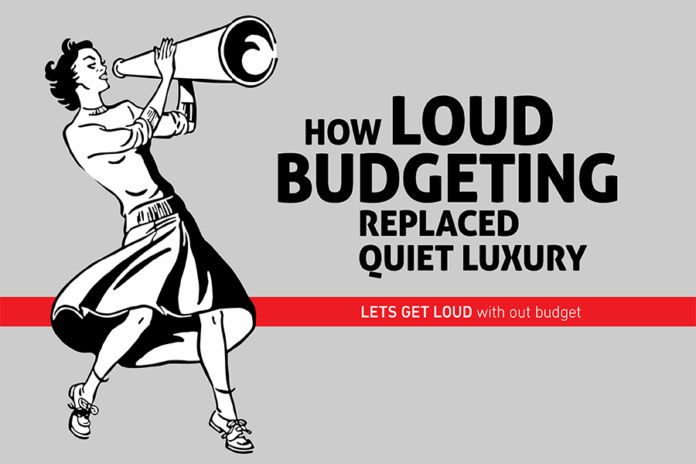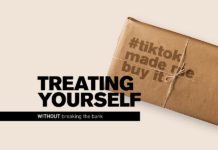It’s post-COVID, late in 2022. You’re sporting new Chanel sunglasses with a nearly indiscernible logo. The people passing you on the street wouldn’t necessarily recognize your bag as an Hermes, unless they’re also in the club. Your gold hoops — not 1-inch, not 2-inch, but a subtle 1.5-inch — signal there’s something rare about you. Like spotting a celebrity in the wild, people notice, but they’re not sure why. There’s just something special about you, something that exudes wealth, privilege, power.
Fast forward to spring 2024. The bubble has popped or is at least eminently inflated. Most of us have had a small reality check. That bag, those glasses, even the hoops now feel, if not gauche, then at the very least, frivolous. You worry about appearing out of touch. But, on a more pragmatic level, you worry about your actual finances. Enter “loud budgeting.” A trend that gained traction on social media, loud budgeting describes a way of conducting personal fiscal responsibility that involves public accountability. People who are part of this movement share their financial goals on their social streams and with their friends.
The budgeting side of the phrase involves acts like turning down invitations to pricey dinners, vowing to upcycle clothing, revisiting the value of items already owned and weighing the value of new purchases. The loud element refers to the way in which these decisions and practices are communicated; we tell others, online or verbally, what we want to do, to achieve, to overcome. To an outsider scrolling posts, it may seem self-righteous, but a publicly stated goal carries a much greater degree of accountability. Failure feels more acute when there’s an audience, so we typically work harder to succeed. We can easily justify skipping the gym on a given day, but it’s more difficult when we’ve made plans to work out with a buddy.
By nature, humans experience embarrassment and shame at every life stage. Whether we’re an awkward tween girl, or a mature woman running her own damn life, it’s still an emotion we actively try to avoid. It’s a motivator. There’s inherent value in the threat of contradicting yourself publicly – ask any politician.
On the positive side, the emotional benefits of loud budgeting can be as strong as the financial benefits. People who clearly state their goals and stick to them will feel a sense of empowerment, and experience less stress and uncertainty.
Loud budgeting doesn’t reflect wealth or lack thereof. Rather, it’s about creating transparency and developing boundaries. Maybe you’re genuinely trying to tighten spending due to very real concerns. Interest rates remain high. Housing prices in the Keys are untenable for most working people. Stock markets are volatile. Wages, in most cases, haven’t increased enough to keep pace with rising costs of living. So yes, it’s a very real possibility that your numbers aren’t adding up the way you’d like at the end of the month, and some budgeting measures are necessary. Stating those intentions can help keep things on track.
Let’s say you find yourself in a more fortunate position. Maybe there’s a little play money left after all the bills are paid — a little extra is flowing into savings and retirement. Great. Well done. But that doesn’t mean you don’t, or shouldn’t, have financial goals. Loud budgeting can still be a helpful tool in reaching your goals, whatever they may be.
Another positive element of the trend is that it doesn’t exist purely as a reflection of self. Yes, you’re managing your own accountability and the emotions that relate to that, but you’re also engaging friends and family. People in your corner will likely cheer you on. In hearing your goals, more (ahem) “self-aware” friends may reconsider the offers they’re putting forth. Instead of facing a glut of spendy dinners you feel compelled to turn down, you may find yourself being invited to the dog park, the beach, for a walk or an inexpensive happy hour.
The contradiction of social media as a part of daily life is that it operates like a floodlight. We see the cracks in the infrastructure, and unfortunately sometimes in ourselves, but we also learn. It removes the mystery of topics like financial literacy. It provides easily accessible answers to questions we may be embarrassed to ask. In this way, the platform is actually propping up the movement. The desire for greater fiscal responsibility has spawned a number of “challenges” that encourage good habits. The “cash-only challenge” or the “eating-in challenge” offer fun, friendly ways to hone better spending skills.
Ultimately, most of us are finding ourselves seeking betterment – we’re trying to eat better, move our bodies, pay off debt, save for the future. Loud budgeting removes the stigma associated with an underdeveloped financial literacy, while helping to build those skills. The element of accountability helps people stick to their goals, and the buy-in from a network of friends and family makes the whole process a little more fun. So, while there’s no need to shove that Hermes bag to the back of the closet, you’ll no longer feel as concerned about whether or not anyone is noticing. Just rethink it, and maybe alert a few people, before you consider buying another.


























